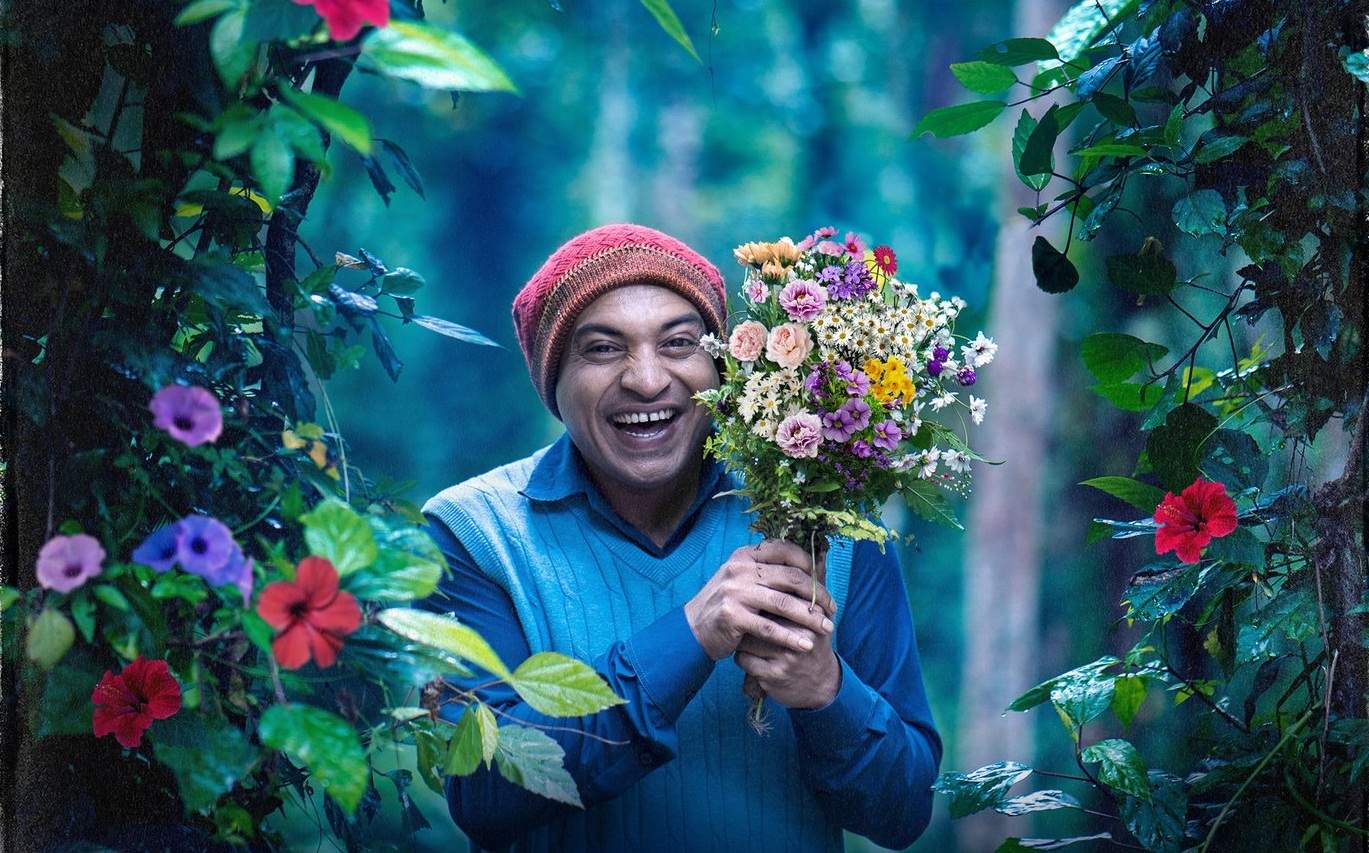
Lovable, do-gooder characters in cinema forever find takers. It does not matter that if the film they inhabit fails to nurture an exact sense of belonging. Our audiences are often ready to keep liberties at bay because there’s always a sweet taste when a weakling emerges a winner. Director Johnpaul George’s second feature Ambili emerges from a similar ground. It tells the story of Ambili (Soubin Shahir), a village bumpkin who is low on IQ, a ‘weirdo’ whom the villagers have become accustomed to. Everyone takes advantage of his ditziness except Teena (Thanvi Ram), his childhood sweetheart. Theirs is an unusual love story which Teena explains in a brief chat with her roommate though not to complete conviction. Then again, love is love. Who are we to judge the rationales here?
Ambili, however, is not about this hard-to-believe romantic relationship. The film is about love, of all kinds. Soubin’s title character, to address this, lives all by himself. He shares a deep, one-sided affection for Teena’s little brother Bobby (Naveen Nazim), who is now a famed national-level cyclist. Bobby seldom reciprocates positively to Ambili’s extremely demonstrative love for him. A yuppie guy with urban sensibilities, he understandably finds his well-meaning childhood friend’s advances intrusive. Wait, even the viewers do, until the film slowly aligns us towards its conventional yet well-meaning central thought.
ALSO READ: ‘Koode’ review – a fantasy tale that addresses the need for closures
Johnpaul designs the first half with plenty of light moments. He introduces Ambili’s immediate living space, his daily routine, his Hangout calls with Teena and the way he is often bluffed by those who owe him money. The film picks pace once Bobby kicks off on a Kerala-Kashmir road trip on his bicycle. Much to his annoyance, he finds Ambili on his old-fashioned bicycle giving him company, all the way to his destination.
Now, this is a difficult plot twist to envision. How would someone like Ambili keep pace with an expert cyclist like Bobby? Even at the cost of assenting to the cinematic liberties taken, one does end up questioning the scenario. It is how over why, at this juncture. It is indeed a cute sight to see the cardigan-clad Ambili tread through the sweltering heat of Goa and Rajasthan. His antics are adorable and Soubin – though fumbling initially – gets the grasp of his part seamlessly. He makes Ambili, the character, work even though he isn’t as adorable as the film wants him to be.
On that note, it is the filmmaker’s belief and perseverance that astonishes me. Johnpaul’s writing is such that it is mandatory for the viewer to adore his leading man, who is a social misfit, an un-hero prototype. There are several emotionally manipulative moments which are also heartwarming by design. I particularly loved the one where Ambili’s elderly neighbour consoles him, “Today, you don’t pluck just one flower. Pluck every flower I’ve got in my garden,” He does so and makes a beautiful bouquet for his ladylove who has just arrived from New Delhi. In a later scene, Ambili makes quick friends with a benevolent doctor and a group of children somewhere in Maharashtra. He bonds with them over kanji (rice porridge). The most emotionally draining moment, predictably, is the climax which showcases Soubin’s acting prowess to a T.
Delving further into Johnpaul’s style, it is clear how the filmmaker does not fully know where to apply his brakes. With a narrative laced with way too many songs, certain sequences lag endlessly. You wait for a twist to emerge but the writer-director has more details and redundant information to share. There are also passages where the film (out of the blue) involves impromptu narrations – sometimes poetry and at other times peripheral characters breaking into soliloquies. The tonal shift is so sudden that it is easy to treat both halves of the film as two disparate entities. Anyhow, through all this mayhem, the filmmaker indeed makes sure to keep his core message tied up to the story – how love, as an emotion, makes life worth living. Filled with sub-stories (one set in Goa is part-surrealist, I tell you) and a certain level of exposition that is hard to ignore, we ultimately end up buying the writer’s vision.
Johnpaul’s craft is ably buoyed by Sharan Velayudhan Nair’s picturesque cinematography. In a film that involves picture post-card frames, the DOP makes sure that the colours remain firmly imprinted, be it the green foliage and the lavender flowers in Kattappana, the deserts of Rajasthan or the snow-capped mountains of Jammu and Kashmir. Editing (Kiran Das) clearly plays a spoilsport as several of the sequences feel elongated, wherein we can sense indulgence in clear terms. Johnpaul’s decision to integrate a number of songs (Vishnu Vijay) which do not contribute much to taking the story ahead is a small-scale misfire. That said, the songs (and their lyrics) as independent singles are stellar and belong well to the film’s mood (especially ‘Aaradhike’). The background score, on the other hand, sounds too manufactured to elicit emotions in you. The excess use of flute during emotion-charged moments seem archaic and jarring.
ALSO READ: ‘Hey Jude’ review – an endearing dramedy that incites a great deal of empathy
Besides Soubin, debutant Naveen Nazin does reasonably well in his debut. His agility and good screen presence add sheen to a part that does not exactly demand histrionics. Thanvi Ram is an expressive new find whose maiden outing does not appear to be one. The supporting cast including Vettukili Prakash, Neena Pillai, Jaffer Idukki and Srilatha Nampoothiri are very well-cast.
Now comes the big question! What impact does Ambili have on me? Well, I did not love the film, even though I badly wanted to. At the same time, I do appreciate the fact that it has a heart of gold. The intent is noble and the core theme (even though subverted by multiple subplots and longish runtime) remains crystal clear until the last frame. Ambili makes you feel positive and chances are high that you walk out with a content heart and a tiny smile on your face. Now, that’s the least you would want from a feel-good drama, isn’t it?
Rating: ★★★

